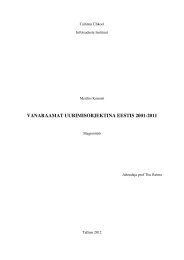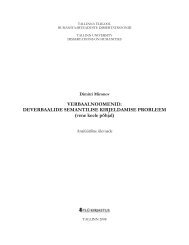Download (1157Kb) - E-Ait
Download (1157Kb) - E-Ait
Download (1157Kb) - E-Ait
You also want an ePaper? Increase the reach of your titles
YUMPU automatically turns print PDFs into web optimized ePapers that Google loves.
investment. Staff are the key asset in libraries whose value can be enriched through<br />
investments.<br />
The following discussion aims at suggesting how intellectual capital can be used to improve<br />
knowledge sharing. It discusses the issue of human capital and structure capital to suggest<br />
how the former and the latter can help libraries excel in knowledge sharing. Such aspects as<br />
leadership, hiring schemes and training are explored under human capital. Subsequently the<br />
discussion on how structural capital can be used to improve knowledge sharing concludes<br />
this chapter.<br />
4.3.1.1. Leadership.<br />
As Bob Buckman suggests in section 2.4.2.1 the culture is indeed important for knowledge<br />
sharing to succeed. Buckman insists that leaders play a key role in shaping the culture which<br />
will have an impact on the organisation‟s ability to share knowledge across time and space.<br />
As noted with the responses from the field, seventeen out of twenty one respondents agreed<br />
that their libraries have a vision. Even though it was beyond the scope of this research to<br />
investigate any strategies for updating library visions, the mere fact that majority of responses<br />
13 of 21 (62%) agreed that the vision is often shared, allows us to postulate that, if sharing is<br />
emphasised in their visions the situation could have been better. Libraries need leaders who<br />
will work as a team to convey a clear and consistent understanding of the vision not only<br />
through their words but as exemplars through their deeds. The visions can become an<br />
obstacle to achieving a sound knowledge sharing strategy. This research was conducted in six<br />
public university libraries with long history, some of which were in existence as early as the<br />
1970‟s (i.e. University of Dar es salaam). This suggests that if leaders come and go and still<br />
use the same vision, then chances are high that none of the visions are anywhere close to<br />
promoting knowledge sharing.<br />
The data collected suggest that knowledge sharing has not been very successful. Sharing<br />
between library staff scored 81% (17 out of 21) through meetings and with other libraries<br />
71% (15 of 21) through best practices. Interpersonal communication as pointed out in 4.1.2<br />
will be more effective for knowledge sharing between staff, whereby the staff asks their<br />
colleagues what they believe their colleagues know better. Online forums and wikis could<br />
have been better ways to learn from other libraries. The keys leading to the success of<br />
53

















